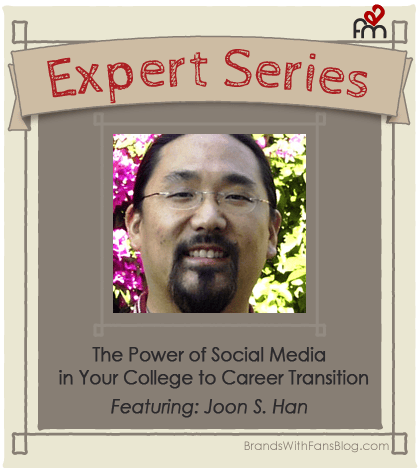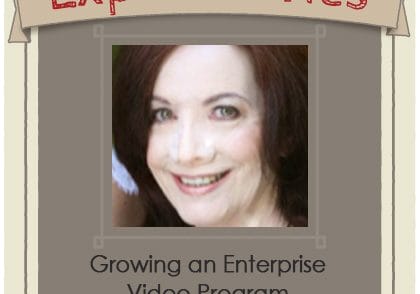Fandom Marketing welcomes Joon S. Han, business strategist, catalytic agitator, fan of all things social entrepreneur and author/podcaster of the upcoming book Get Ahead by Giving Back. Read his timely article about how you can get ahead in your career using social media for jobs.
Hard-working, eager students have either just graduated or are about to graduate from fine learning institutions all across the world. But, unfortunately, times are still tough and the job prospects for these talented young men and women come with mixed optimism and pessimism (and even more pessimism) depending on the day.
In this uncertain employment climate, what should a new graduate to do to in order to land the first step in a (hopefully) prosperous career path?
In the strategy world, I focus resources on the things that I can control and predict rather than the things I can’t. It’s a straightforward, logical tactic: I have a much greater chance of mastering and being successful with elements I have a direct impact on.
If I were a new graduate today, I’d absorb the cool, inspirational, and sage life advice being shared by notable experts and then put together a job search strategy that utilizes the primary, tangible advantage a recent graduate has (or at least should have) over other candidates in the field, namely social media.

To use social media effectively as a new job seeker, you’ll need to look at it in a much different light than before; it must be considered a strategic tool versus merely a way to connect and have fun with friends. In fact, the difficulty of this mind shift is primarily why we advise clients against hiring young people to lead social media efforts within their companies. Are they capable of basic social media implementation? Absolutely. But lead and strategize? Sadly, no.
Here are the four things I recommend doing RIGHT NOW via social media to greatly multiply the job prospects available to you.
1. Stalk Like a Genius
I’m shocked at how little recent graduates know about their most powerful business friend in social media: LinkedIn. This impressive global network is devoted to helping people get jobs and advance their careers; in fact, LinkedIn was developed with expert input from the executive recruiting industry specifically to control access to top talent around the world.
Start by letting the site guide you in building out a professional profile and then think about who is best qualified to give you an official LinkedIn recommendation; many employers will not look at a LinkedIn profile that doesn’t include at least two recommendations. One challenge in leveraging LinkedIn is that your list of professional contacts may be somewhat limited at first, so build out your network as soon as possible and ask for short, genuine recommendations from the teachers, coaches, and volunteer and community managers who know you best.
Side Note 1: I’m simply aghast at how few students follow through and connect with me after speaking with me in-person at a lecture or event… perhaps they don’t realize that my network is HUGE and can benefit them if they’re willing to take the initiative to act professionally.

As your LinkedIn network grows, you’ll realize that new jobs will appear in your search parameters because many employers only want their jobs to be found by people loosely connected to the company by 3rd degree connections and referrals. This is why, as a job seeker, you should connect to individuals you don’t necessarily know well now but who you may want to get to know better in the future.
Next, make an effort to find the “right” people — those that have some say in hiring for their companies or who simply have large networks and are credible because of their recommendations — and then make yourself the best candidate possible. For both goals, use LinkedIn’s robust features to identify companies, connect with and follow experts you meet at events, and “stalk” (i.e. monitor) the newsfeeds and activities of hiring managers and department leaders of companies you’re interested in and qualified for. By doing this, you could actually find out where to meet prospective employers in-person at an upcoming event, conference, or workshop rather than trying to connect through pure digital methods.
Advanced-Level Tactic
Contact an executive administrative assistant from a company of interest to you and ask to shadow the best employee or manager in a specific department. You’re young enough that the parties involved won’t see you as a threat and they may appreciate the initiative you showed.
Side Note 2: It constantly surprises me when the young people who shadow me through internships and similar situations don’t take notes. This is a unique opportunity to get real inside experience, so put your smartphone, tablet, and paper to good work and record what I’m sharing with you.
2. Control the First Impression
Rarely do you get to completely control the perception that others are going to have of you, especially during first impressions. The great thing is that social media helps you do exactly that! On LinkedIn, you can highlight your strengths, experience, knowledge, and — most of all — uniqueness simply by having a completed profile. This is why I also recommend configuring your LinkedIn settings to allow other people to see when you’ve viewed their profile: it shows your interest in them, and in return, they may want to show their interest in you (think of it like catching someone glance your way at a park). When it comes to landing your ideal job, you want to stand out and be memorable, not anonymous, but please: be memorable for the right things. Get out of the habit of using less-than-professional emoji and text-shorthand (who really ROFLs anyways?) in your posts and messages, and learn to change your view settings on Facebook so your photos and status updates reach specific audiences (family, friends, business contacts).
To boost your job search, you can use LinkedIn to gain greater-than-average expertise through your participation in groups. The biggest advantage for you as a new graduate is to appear to have more accumulated knowledge and expertise than your competition. Depending on the size of a particular LinkedIn group, sometimes all it takes is a handful of questions, posts, and replies to achieve the deceivingly important “influencer status” for that group on any given week (note: the influencers list seems to be refreshed every week).
Advanced-Level Tactic
The tips I offer for LinkedIn are all available at the free membership level and the only real limitation is that you can’t send unlimited connection requests to people you don’t already know. An easy workaround to this is to join a group of the person you’re trying to connect with; this is why I normally keep 10-15 groups spots fluid for swapping out. Most members of a group will keep the setting that allows other group members to message them. If I’m trying to connect with someone I want to impress, I’ll join one of their groups I have some relevance to and be constructively active until I hit the “influencer” level for that week. Then I send a request from that group to my target person, and since our only connection is that group, that’s usually the first place they go to see who I am… and wow, what a great first impression!
3. Nerd It Out
The most powerful thing about each social media platform is that they all allow you to show off your uniqueness in a way specific to that site, and it’s just a few intentional steps from uniqueness to expertise. If you can consistently communicate your deep love and understanding of a few specific interests, you’ll be setting yourself apart from the masses of forgettable job applicants out there. Embrace your inner-nerd — don’t be ashamed to show what you know about the things that you care about.
For example, if you want to be known as a designer, show me your stuff (and a LOT of it) as well as share your thoughts on other great designer work. If you’re trying to show me that you’re a worthy writer, then I expect you to write a lot — anywhere and everywhere — so that I can get a feel for your depth, style, and versatility and determine if I can hire you as a subject matter expert or as a multi-function content writer. If you want to flex your financial prowess, discuss economic trends you’re watching and support your interpretations with analytical abilities. You get the idea.
You are not trying to fit in with your social media profiles and activity; you are trying to be remembered and respected! There are tons and tons of advice on how to be a powerful “personal brand” so don’t wait for someone to give you permission — start right now!
4. Get Your “Reps” In
One of my favorite coaches in high school did a great job of reminding us that “perfect practice makes perfect.” However, there are situations in life with few opportunities for which to prepare so any practice at all is going to be extremely valuable. Networking effectively, pursuing and performing interviews, and practicing strong communication and follow-through are all skills you will get better at by the sheer number of hours you put into them.
How comfortable are you talking to strangers, asking insightful questions, actively listening, promoting yourself without sounding pompous, and putting out calls to action? None of us get great at doing these without real-time, crash-and-burn experiences. Because experience will be your best teacher for these types of business skills, you simply have to get your “reps” in as often as you can. Once you do, you’ll be in a much better position and be a much better professional overall in leveraging your connections and job-seeking activities. The great thing about practicing these soft skills in situations that matter is that it will strengthen you for the rest of your life.
Advanced-Level Tactic
On your LinkedIn “Connections” page, you can “edit details” and add notes that only you can see for each of your contacts. This is an important area to record direct email addresses and phone numbers, best times and ways to contact a person, and your goal in connecting with her or him. Remember, you should be networking with a LOT of people and it’s good to have a tool to help you remember relevant details about the people you meet as well as where each conversation left off.
By laying a great foundation with my above tips, you can move on to finding that great new job just like a pro! Strive for success, but stay grounded and remember that your job or what you do for work is just a part — significant as it is! — of who you are and that you will encounter new challenges and opportunities throughout your career. Someday you may decide to start your own business (entrepreneurs are my passion after all) so in the meantime, don’t forget little tips like this to help you along the way!
Meet Expert: Joon S. Han

Joon S. Han is a business strategist, catalytic agitator, fan of all things social entrepreneur and author/podcaster of the upcoming book Get Ahead by Giving Back. You can find out more and connect with him at JoonHan.com, LinkedIn and @joonman.
Want to be featured next? Fandom is looking for social marketing rock stars to share their stories, case studies, tips and expertise. Check out our blogging guidelines and contact us or tweet us @FandomMarketing today.





6 Comments
[…] of hiring managers use social media to research candidates. So, how should a college student transition their accounts? Here are some transitional social media […]
[…] las redes sociales para buscar candidatos. Así que, ¿cómo debería un estudiante universitario cambiar sus cuentas? Aquí hay pistas de medios de comunicaciones sociales de […]
great
I think that really worth it
[…] of hiring managers use social media to research candidates. So, how should a college student transition their accounts? Here are some transitional social media […]
[…] las redes sociales para buscar candidatos. Así que, ¿cómo debería un estudiante universitario cambiar sus cuentas? Aquí hay pistas de medios de comunicaciones sociales de […]